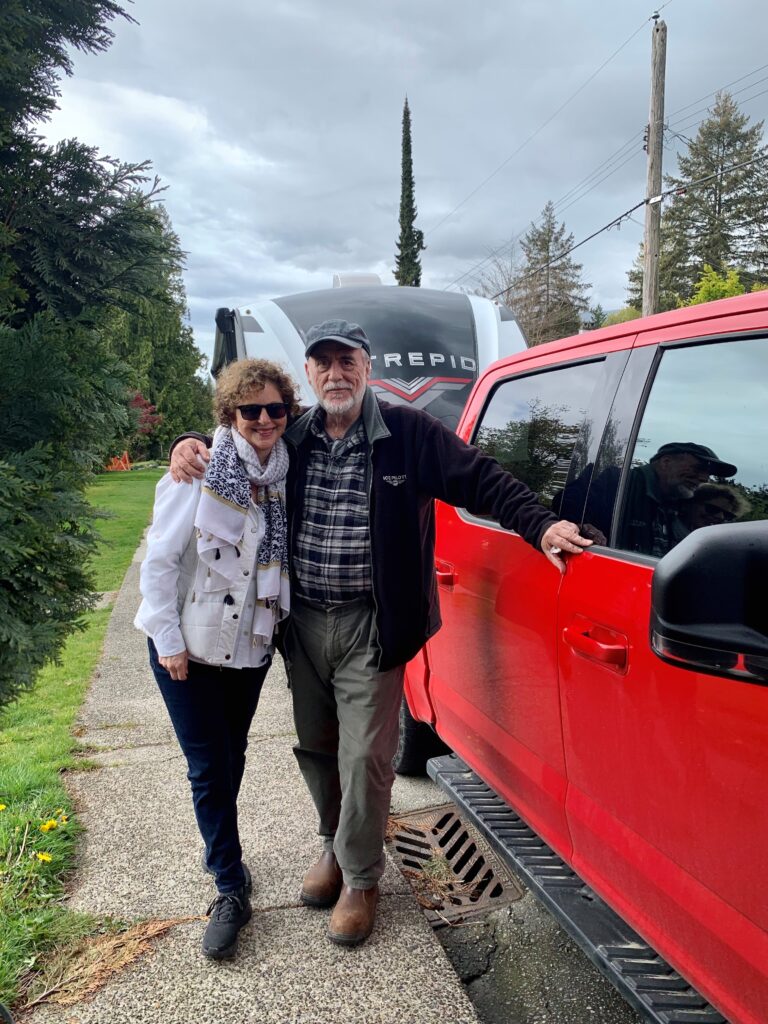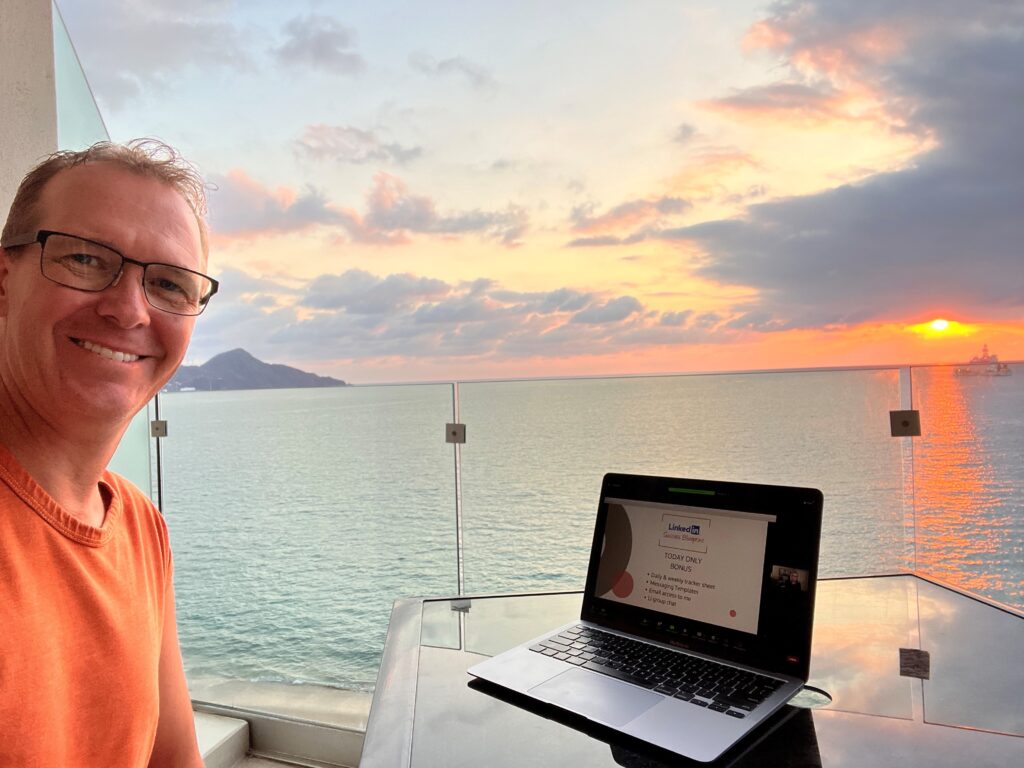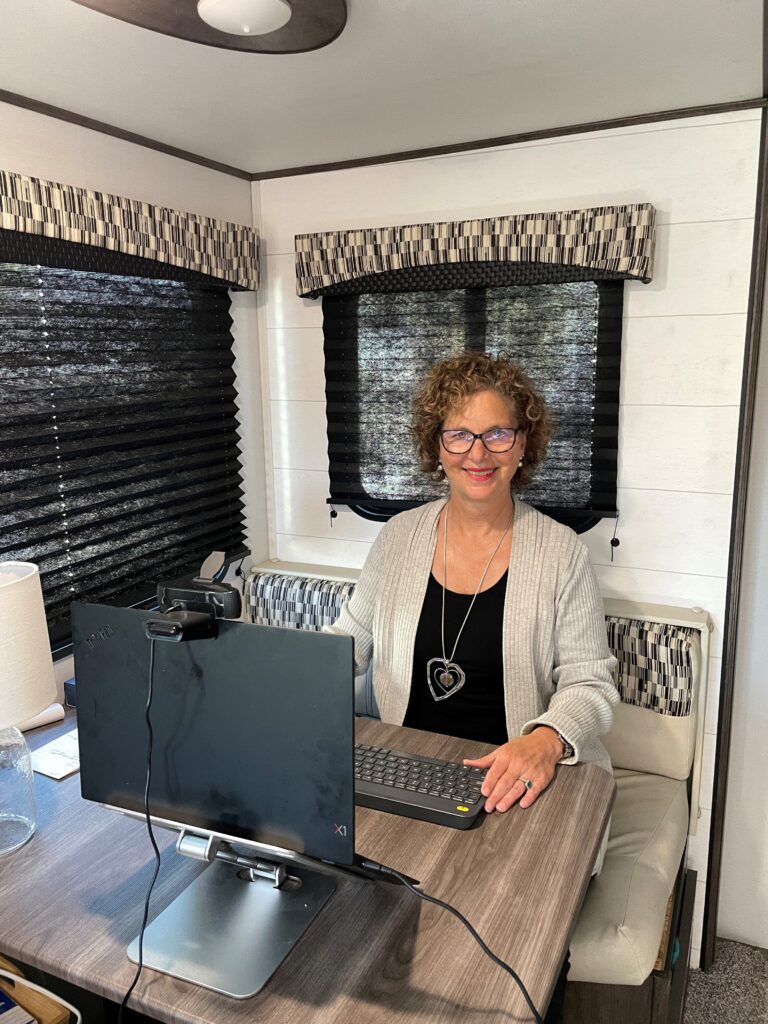Co-founder and CEO Money Coaches Canada

Wayne and Karin with their rig
To say that my husband Wayne and I are quite different is an understatement. He’s an artist and I’m a financial planner. Say no more! However, the one thing we are in perfect agreement on is that we love road trips. Any chance we get, we hit the road and often use this opportunity to dream and set goals and intentions for our life together.
Over the years one of our big dreams was to buy an RV and bring our home with us on our adventures.
We hit a few roadblocks when the time came to make this a reality. I had envisioned a little cozy 20-foot van and he had his sights on a Willy Nelson celebrity bus to the tune of $300K+. With my financial planner hat on, I quickly kiboshed that idea.
We (ok I) set a budget and started shopping. Wayne had always wanted a big red truck, so we settled on a modest truck and travel trailer to see if this life was for us.
While Wayne is a retired history prof, I’m still several years away from retirement so a big consideration was whether it was possible (or even desirable) to work on the road. I knew that, at least in theory, I could work from anywhere but was it doable in practice?
If you’re considering working on the road, here are a few of the lessons that we learned so far with some input from my intrepid traveler colleague Steve Bridge:
- You need to be very, very organized
Whether you’re renting a condo or travelling in an RV, it’s a lot harder to be spontaneous especially if you’re trying to work along the way. Planning and researching routes, flights, and accommodations is hugely time consuming and can be especially complicated when fitting travel into your work schedule.
I started by creating a spreadsheet with destinations, mileage, accommodations, and costs. It took hours and hours of research to plot the routes and to read countless google reviews before booking campgrounds. I’ve recently started using an online service called RV LIFE Trip Wizard which makes planning a bit easier.

Steve in his office by the sea
My colleague Steve Bridge, who has worked remotely for a few months at a time in Mexico recommends that you connect with someone who has ‘boots on the ground’ for local knowledge and who can answer questions honestly about your desired destination.
Do your best to have a contract for your rental accommodation. Send the minimum deposit acceptable (which isn’t necessarily the amount asked for). Steve also recommends confirming and reconfirming accommodation arrangements. You want to avoid any unnecessary inconveniences especially if you have deadlines and work commitments.
- Be prepared financially for the unexpected
On my very first camping trip, I blurted out as if I were a veteran RVer: “There’s always something that happens when you’re camping!”. I am still being teased about my “expertise”, but turns out, I was oh so right.
Despite all the advanced planning and budgeting that we did upfront, unexpected repairs and costs cropped up. Currency fluctuations, inflation and lack of firsthand knowledge of a location can also add to the overall expense of your adventure.
Make sure you have a detailed list of all the anticipated expenses and add a minimum of 20% to whatever you’ve budgeted for your travels as a contingency fund.
You’ll also need to decide what to do about your home while you’re away. Given the extended travel we wanted to do, we decided to rent the suite in our home. This gave us peace of mind that someone was looking after the house while we were away, and also added a few dollars to our travel fund.
If you’re renting your home for an extended period of time, be sure to update your home insurance and talk to an accountant or financial planner about the tax implications for claiming expenses and the principal residence capital gains exemption.
- Technology isn’t always your friend
One of the biggest considerations for working away from your usual home or office is the reliability and security of internet access and cell service. There is a dizzying array of gizmos and emerging technologies to address this issue but many of these options are not available or reliable everywhere.
When researching the locations for the working portion of our travels, strong secure Wi-Fi and cell service were non-negotiable. Most campgrounds or hotels have Wi-Fi, but most often are not secure. We avoided accommodations that didn’t have secure Wi-Fi unless we were vacationing and didn’t need to access my work computer. We opted for a cell booster so I could hotspot if secure Wi-Fi wasn’t available.
Steve recommends doing as much research as possible before you book your accommodations and ideally have someone at your planned destination run a Wi-Fi speed test to save headaches when you arrive, especially if you’re planning to use video conferencing.
We’re watching satellite Wi-Fi options like Starlink for our next big trip.
- Get creative about staying healthy
One of the things I love most about being on the road is that everything seems new and fresh. The downside is that the routines of your regular home life may be left behind, especially ones related to health and wellness.
Because of COVID-19, there are now a lot more online options for staying fit. I regularly attend 2 live online dance and fitness classes a week, have access to “on demand” work-out videos and have a set of weights with me. Admittedly it’s a bit of a challenge in a tight space, but it’s also been fun figuring out how to make it work.
A lot of the RV campgrounds also have fantastic options for activities on site, so I’ve been able to fit in dance classes or a swim between meetings. And if you’re working in a warmer weather climate during the winter, there aren’t many excuses not to enjoy the great outdoors. Hiking and biking are great ways to explore new surroundings.
Travel insurance can be a big-ticket item if you’re working outside Canada for any length of time. After age 60, it can be more difficult to qualify for coverage. You may need to consider travel insurance even if you’re travelling outside your province within Canada. While most provinces health programs cover out-of-province medical care, there are some exceptions and administrative issues, so do your research beforehand.
You also need to make sure that you don’t lose your Canadian health coverage by being out of your province or country for too long. Most provinces require minimum residency of between 4 and 6 months to continue with health insurance coverage.
- Be open to new ways of working and living

Karin’s office on wheels
While life on the road can be exhilarating and enriching, it’s not the same as a relaxing beach vacation. It brings new responsibilities and activities that may be unfamiliar and sometimes very stressful. It took Wayne and I several months to settle into new rhythms and patterns and to feel more comfortable with propane heaters, emptying holding tanks (his job, not mine!), backing up the trailer – hmm, still not comfortable with that one!
It was a great relief for us to find so many mentors and “angels” who helped us out or came to our rescue along the way. Thanks to all of them we’re still happy campers… mostly!
One of my big lessons learned was that it’s too stressful to work when we’re on the move. We now book chunks of time in one location where we can settle in and “live” in that location for at least a month at a time. Weekdays are workdays but on the weekends we get to enjoy what our new surroundings have to offer.
If you’re working and travelling as a couple or a family, it may be difficult to synch schedules and to share a smaller space. Depending on the size of the accommodations and what your co-travellers are doing, Steve recommends finding a workspace to separate vacation from work and to ensure privacy and confidentiality. One of the reasons we opted for a truck & trailer RV option was to give us more flexibility so that Wayne could use the truck when I was working.
We also chose an RV model with a door that closed off a separate space with a very tiny workspace (ok, a closet) for Wayne. Without his usual home and garden activities and responsibilities, Wayne is using our “live away” time as an opportunity to rekindle some of the writing projects that he’s hoped to energize for years.
Life on the road has introduced us to many new places, but more importantly it’s opened us up to new visions and options for fulfilling our dreams and desires.
Surprisingly, living in a small space has been a lot easier than we imagined. We’ve had to be more patient with each other and invented a few new do-si-do dance moves, but overall, it confirmed my suspicion that we need a lot less than we have. Wayne still sometimes covets the bigger rigs, but for now, we’re happy with what we have and the adventures ahead. Stay tuned!
If you need help re-imagining your money and your life, book a complimentary session with a money coach.



Really great article Karin! You’ve got me thinking about an RV trip now!
One thing we should have added is using a VPN (Virtual Private Network) for an added layer of security if using a public wifi network.
Steve
Thanks Steve. Good point. I try to avoid public networks by hotspotting from my cell. This usually works with my cell booster even if cell coverage isn’t great. However VPN a good option if cell service isn’t available or too expensive outside Canada.
excellent summary of key points to consider as more and more people head back out into the world! I am super lucky. we are living in the mountains of BC for 3 weeks 3 times this winter. my dream of skiing more…well, thats not happening, but the change of pace and scenery is fantastic and revitalizing.
Thanks David. Glad you’re getting a chance to enjoy our beautiful province!
Love this story! You have so much insight to share. With so many people travelling and working remotely, I’d be curious to know more about the tax implications of the “workcation”. What qualifies for home office deductions and expenses? How do you manage tracking expenses and income in different currencies? Maybe your next article? 🤓 Thanks for sharing your experiences!
Thanks for your kind words Denise! It’s hard to comment on tax implications generally with respect to workcations since there is so much variation on a case by case basis. You can find out about home office deductions and qualifications here. https://www.canada.ca/en/revenue-agency/services/tax/businesses/topics/sole-proprietorships-partnerships/report-business-income-expenses/completing-form-t2125/business-use-home-expenses.html
I recommend reaching out to an accountant to discuss tax specifics especially if you are planning on working outside of Canada.